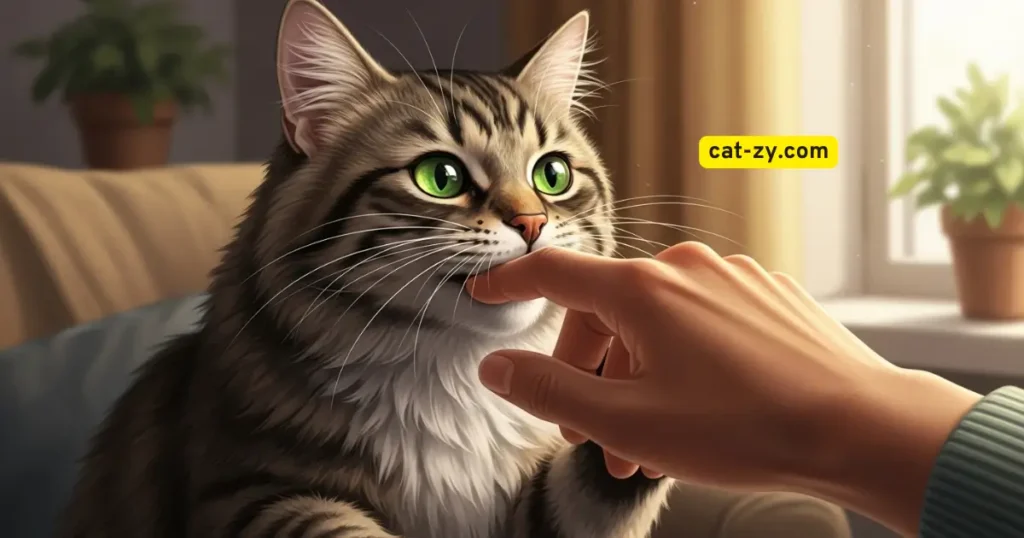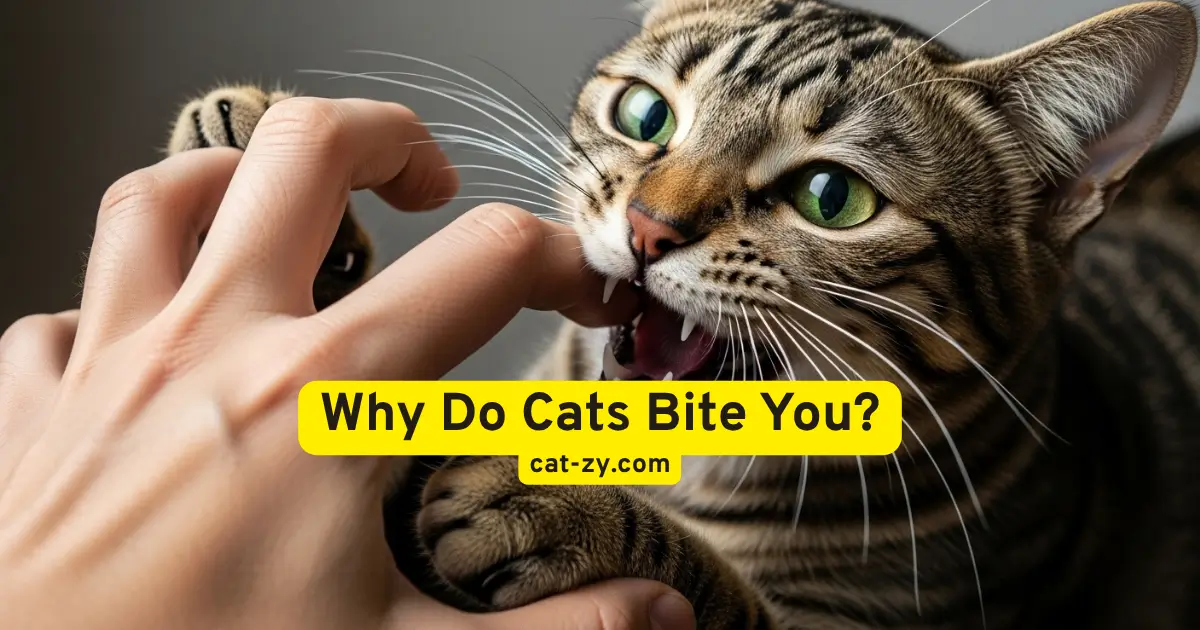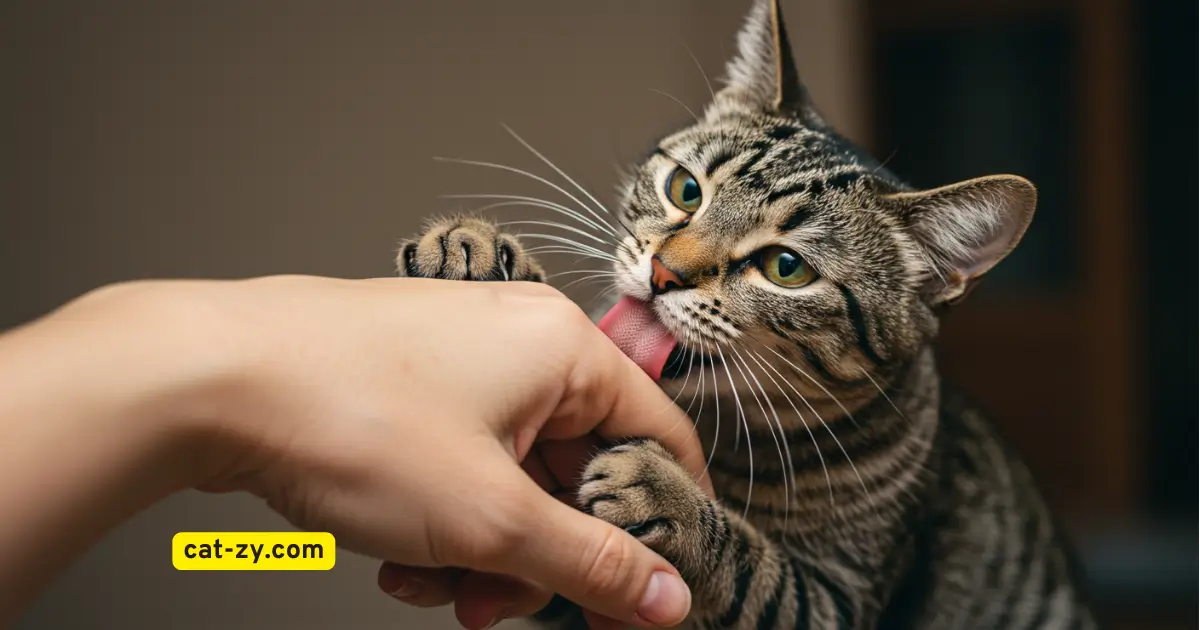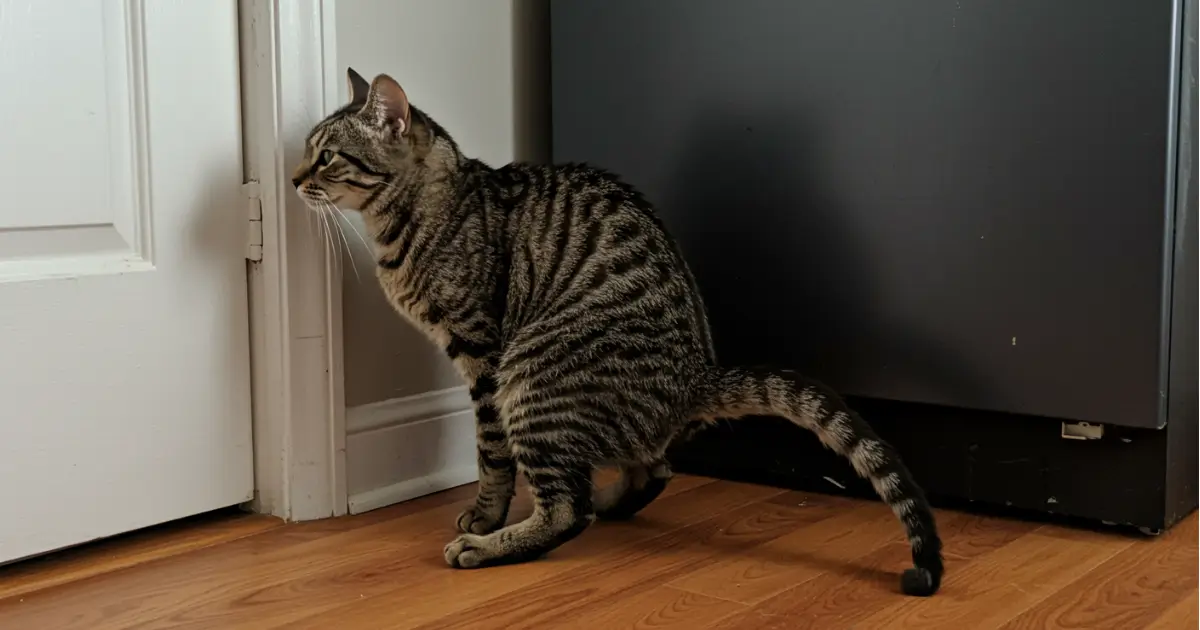Why Do Cats Bite You? 6 Powerful Insights Into Feline Behavior
If you own a cat, you might have been surprised by a bite. It hurts and can be confusing. You might wonder, Why do cats bite you in the first place?
Feline behavior is complex. Knowing why your cat bites can make your bond stronger. It also helps avoid future bites.
Looking into Feline behavior shows that bites can come from many reasons. These include instinct, emotions, and even health problems.
This article will explore six key insights. They help understand why cats bite. This knowledge can make your relationship with your cat safer and more loving.
Table of Contents
The Complex Nature of Feline Communication
Feline communication is complex, using body language and vocal cues. Cats send many signals to show their feelings and plans. Sometimes, humans don’t get these messages right.
How Cats Express Themselves Through Body Language
Body language is key in feline communication. Tail positions, ear orientations, and whisker twitches all mean different things. A tucked tail might show fear or submission. A lashing tail could mean irritation or anger.
Recognizing these behavioral indicators allows you to gauge your cat’s emotional state effectively. It also helps you avoid getting bitten.
Vocalizations and Their Hidden Meanings
Cats use different sounds to talk to us. Meowing, purring, hissing, or growling each has its own meaning. For example, a hungry cat might meow loudly. A happy cat might purr softly.
Understanding these sounds helps you know how your cat feels.
The Importance of Reading Your Cat’s Signals
It’s important to read your cat’s signals to avoid bites and have a good relationship. Paying attention to body language and sounds helps you understand your cat better. This way, you can meet their needs and avoid misunderstandings that might lead to biting.
In conclusion, feline communication is complex and full of different signals. When you learn to decode and respond to your cat’s communication cues, it strengthens the bond between you both. This can also lower the chance of getting bitten.
Why Do Cats Bite You: The 6 Key Motivations
Still, wondering why do cats bite you? It’s key to look at the six main reasons. Cats have many emotions and needs. Their bites show different issues.

Play Aggression: When Fun Gets Too Intense
Play aggression is a big reason for cat bites. Cats use their mouths and teeth during play. If play gets too intense, they might bite.
This is normal in kittens as they learn to control their bites. But, it can stick into adulthood if not managed right.
Overstimulation: The Petting-Induced Bite
Some cats get too much from petting or stroking, and biting. This can happen if the touch is too much or lasts too long. Cats, like humans, have personal space that should be respected.
Fear and Defensive Reactions
Fear makes cats bite. Cats resort to biting as a protective mechanism when sensing danger or experiencing fear. Knowing when a cat is scared can help avoid these bites.
Pain or Medical Issues
Cats in pain or with health problems might bite. If your cat bites more than usual, check for health issues.
Territorial and Status-Related Aggression
Cats can be territorial and bite to defend their space or show dominance. This is more common in homes with more than one cat.
Redirected Aggression: Misplaced Frustration
This displaced aggression occurs when a cat cannot confront the source of its frustration, such as spotting another animal outdoors, and instead directs this energy toward nearby humans. It then bites its owner or another nearby person.
Knowing these six reasons can help you deal with your cat’s biting. You can change how you play, watch for overstimulation, address fear, check for pain, manage territorial aggression, or find what’s causing redirected aggression. There are many ways to improve your relationship with your cat.
Distinguishing Between Playful Nips and Aggressive Bites
Knowing the difference between playful and aggressive bites is crucial. It helps you react the right way to your cat’s actions. This makes your relationship safer and more loving.
Cats bite for many reasons. It’s important to know why they do it. This helps solve the problem better.
Physical Characteristics of Play Biting
Playful nips are soft and don’t hurt. They don’t break the skin. Your cat might also play by pouncing or chasing toys.
The physical characteristics of play biting are:
- Gentle pressure
- No intent to cause harm
- Often accompanied by other playful behaviors
Warning Signs of Genuine Aggression
Aggressive bites are harder and can hurt. Warning signs of genuine aggression are:
- A stiffened body posture
- Growling, hissing, or spitting
- A direct stare
- Ears lay back or flattened
Seeing these signs early can stop things from getting worse.
Context Clues That Reveal Your Cat’s Intentions
The setting of the bite tells you a lot. If your cat bites while playing, it’s likely playful. But if they bite when touched or handled wrongly, it might be fear or overstimulation.
By looking at the bite’s physical signs, aggression warnings, and the situation, you get your cat’s message. This way, you can interact with them safely and positively.
The Developmental Origins of Biting Behavior
To understand why your cat bites, look into their early life and social experiences. The reasons for biting are complex and influenced by many factors. These shape your cat’s actions today. Learning why do cats bite you often requires looking at their early development.
Early Socialization and Its Lasting Impact
Early socialization is key in shaping your cat’s behavior, including biting. Kittens are handled gently and are often less aggressive. Positive early interactions build trust and reduce fear-based aggression.
Kittens isolated or handled roughly may bite more. This is due to fear or defensiveness.
The Critical Weaning Period
The transition from mother’s milk represents a crucial developmental phase for young kittens. It affects their biting behavior. Abrupt or stressful weaning can cause anxiety and aggression.
A gradual, stress-free weaning is best. It helps kittens learn social skills, including bite inhibition.
How Past Experiences Shape Current Behavior
Your cat’s past, including trauma or negative interactions, shapes their behavior. Cats abused or neglected may bite more due to fear or mistrust. Understanding their past helps address their biting.
By recognizing the causes of your cat’s behavior, you can create a safer, more comfortable home for them.
Exploring your cat’s biting origins offers insights into their behavior. This knowledge is crucial for a better relationship with your cat.
Responding Effectively to Cat Bites
When your cat bites, it’s important to understand why. Understanding “why do cats bite you” helps you respond better. It could be due to play, too much stimulation, or fear. Your actions can either make the problem worse or help fix it.

Immediate Actions to Take When Bitten
Stay calm if your cat bites. Don’t make sudden moves or loud noises. This can make things worse. Instead, slowly pull your hands or the affected area away.
For minor wounds, wash the area thoroughly using soap and clean water. Watch your cat to see what might have caused the bite.
Common Reactions That Make Biting Worse
Some actions can make your cat bite more. For example, punishing or scolding your cat can make them anxious. Also, playing too roughly or teasing can trigger aggression.
It’s key to notice these signs and change how you interact with your cat.
When a Bite Requires Medical Attention
Not every cat bite needs a doctor, but some do. If the bite is deep, bleeds a lot, or looks infected, see a doctor. While uncommon, feline bites may transmit infections such as cat-scratch fever or rabies.
If you’re not sure about the bite or your cat’s shots, it’s better to be safe and get medical advice.
Establishing Healthy Boundaries
Setting clear rules is crucial for managing your cat’s biting. Be consistent and make sure everyone agrees. This way, your cat learns what’s okay and what’s not.
Positive rewards for calm behavior can also teach your cat to be gentle. This helps them understand how to interact better.
Training Techniques to Minimize Biting
Understanding why do cats bite you forms the foundation for building a stronger connection. Good training can fix the reasons behind biting. This approach creates a more harmonious dynamic between you and your feline companion.
Positive Reinforcement Strategies
Reward-based training methods prove highly effective for feline behavioral modification. It uses treats, praise, or play to encourage good behavior. Reward your cat for calm or gentle actions right away.
This method helps reduce stress and anxiety. These feelings can make your cat bite more.
Effective Redirection Methods
Redirecting your cat’s attention is key. Offer them toys or play instead of biting. This channels their energy and instincts into better behaviors.
By giving them a good outlet, you lower the chance of biting.
Consistency: The Key to Behavioral Change
Consistency is vital in training your cat. Set clear rules and stick to them. This helps your cat know what’s expected.
Make sure everyone in the family agrees. This avoids confusing your cat and messing up the training.
Age-Specific Training Approaches
Training methods change with your cat’s age. Kittens need play-based training, while older cats need gentle, slow steps. Understanding your cat’s life stage enables you to customize training techniques for optimal outcomes.
Using these training methods daily can reduce biting. It builds a loving and respectful bond. Always remember that patience and consistency are essential for change.
Creating an Environment That Reduces Biting Triggers
A well-designed home can help reduce your cat’s stress and biting. Making a few changes can lower the chance of biting. This includes adjusting your home and how you interact with your cat. Once you understand why do cats bite you, creating the right environment becomes easier.
Selecting Appropriate Toys for Different Bite Motivations
Choosing the right toys is key to changing your cat’s biting behavior. For playful biting, interactive toys like feather wands or laser pointers work well. For anxious biting, calming toys with catnip or treats can calm them down.
Designing a Stress-Free Cat-Friendly Home
To create a stress-free home, make it quiet and calm. Keep the layout the same to avoid stress. Adding vertical spaces for climbing and observing is also good.
Exercise and Play Routines That Satisfy Natural Instincts
Regular exercise and play can lower biting due to excess energy or boredom. Playing with your cat using different toys or even a ball of yarn works. Additionally, establishing calm periods within daily schedules promotes feline relaxation.
Safe Spaces and Retreat Options
It’s important to give your cat safe spaces to retreat to when feeling stressed. This could be a cozy bed in a quiet room or a cat tree for a secluded spot. Having these areas can greatly reduce stress-related biting.
By using these strategies, you can make your home a place where biting is less likely. These approaches will strengthen the connection between you and your feline friend.
When to Seek Professional Help for Biting Issues
It’s important to know when your cat’s biting needs a pro’s help. Some bites can be fixed by changing how you interact with your cat. But if the biting keeps happening or gets worse, it might mean there’s a bigger problem.
Red Flags That Indicate Serious Behavioral Problems
Some signs can mean your cat’s biting is more than just a nip. Look out for bites that happen more often or get worse. Also, if your cat starts biting without any reason, or if it comes with other aggressive acts. Recognizing these warning signals makes seeking professional assistance crucial.
Types of Feline Behavior Specialists
Many experts can help with your cat’s biting. You might find certified animal behaviorists, vets who know a lot about behavior, or cat behavior consultants. It’s important to pick someone with the right skills and experience.
What to Expect During Professional Intervention
When you get help, the expert will first check your cat’s behavior. They’ll find out why your cat bites and make a plan to fix it. This plan might include changing your cat’s environment or teaching new tricks.
Medication Options for Severe Cases
In some cases, your cat might need medicine for biting linked to stress or health problems. Always talk to a vet or certified behaviorist before starting any medicine. They’ll make sure it’s safe and works well for your cat.
Getting professional help can really help your cat and you get along better. Knowing when to ask for help and what to expect can start you on the path to a safer, happier life with your pet.

Conclusion: Nurturing a Harmonious Relationship With Your Cat
Understanding why do cats bite you is key to a good relationship with your pet. Recognizing how cats communicate and why they bite helps you solve the problem. This way, you can improve your bond with your cat.
As a cat owner, knowing your cat’s language and behavior is important. A stress-free home, fun toys, and enough exercise help prevent bites. Setting clear boundaries also helps keep your cat safe and happy.
This guide provides valuable knowledge and techniques for better feline comprehension. Paying attention to your cat’s needs and recognizing signs of fear or stress is crucial. Taking steps to prevent bites is essential for a harmonious relationship.
By following these tips, you can have a more loving and positive relationship with your cat. Learning more about your cat’s behavior helps you build a strong bond. Embrace the rewarding experience of building a deeper bond with your feline companion.
Why do cats bite you as their owner?
Cats bite for many reasons. This includes play, too much excitement, fear, pain, defending their territory, and redirecting anger.
How can I tell if my cat is biting playfully or aggressively?
Playful bites are soft and light. Aggressive bites are hard and come with signs like hissing or growling.
How can I stop my cat from biting me?
To stop biting, give your cat the right toys. Play with them without using your hands. Watch their body language and don’t overexcite them.
Why does my cat bite me when I’m petting them?
Cats may bite when petted too much. Watch for signs of discomfort. Stop petting if they seem upset.
Can past experiences influence my cat’s biting behavior?
Yes, past experiences can affect your cat’s behavior. This includes early life and any scary events.
How can I respond effectively when my cat bites me?
Stay calm and pull your hands back if bitten. Don’t punish your cat. Try to figure out why they bit and fix it.
Are there any training techniques that can help minimize biting?
Absolutely, reward-based methods combined with attention diversion techniques prove effective. Being consistent is also key.
When should I seek professional help for my cat’s biting issues?
Get help if your cat bites a lot, bites hard, or shows other scary signs like hissing or growling.







